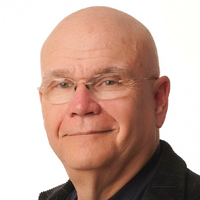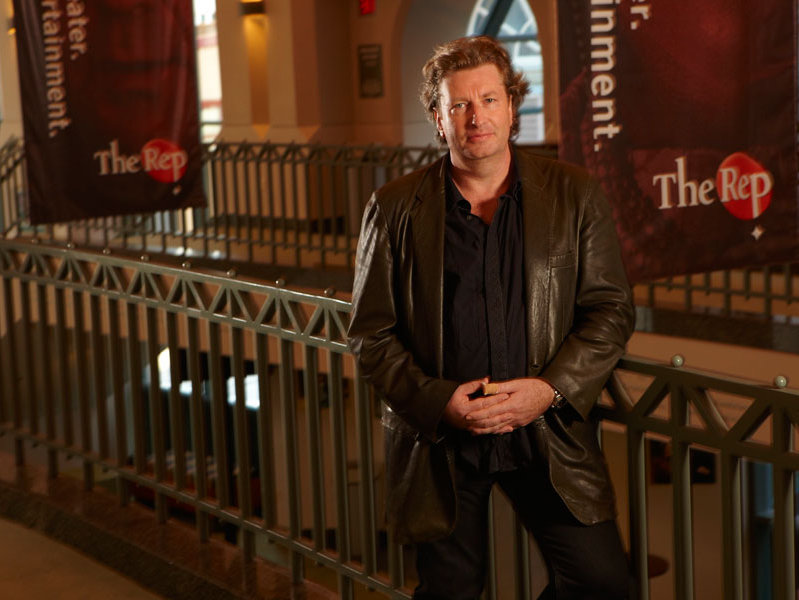Artistic directors of major regional theater companies come with egos of all shapes and sizes.
Some want to be noticed. They put their signatures on productions with personal concepts and spins.
Some want to be stars. They are looking to sweep into New York with grand productions they start in their home cities.
Some are simply ambitious. They climb the ladder from job to job until they are working with the hot playwrights of the moment and directing on Broadway.
During the 17 years he was artistic director of the Milwaukee Rep, Joe Hanreddy was none of those. Modest to the point of being self-effacing, the California native has no problem admitting he was a little fuzzy about Wisconsin's exact location in the Midwest before he moved to the state in 1986 to become the artistic director of the now closed Madison Rep.
After seven years in Mad City, Hanreddy moved 80 miles east to the Milwaukee Rep job. As he now cleans out his glass office overlooking Wells Street to make room for incoming artistic director Mark Clements, it is clear how ideal a match Hanreddy and Wisconsin have been.
Unpretentious and unimpressed by fluff and flash, the artistic director has been very content to maintain a low profile while striving for a high level of creative excellence. The Rep during the Hanreddy era has reflected the community with its attitude and focus on no-nonsense, meat and potatoes theater.
From the moment Hanreddy arrived in Milwaukee, he emphasized his eagerness to build an exceptional resident acting company. That is no longer common in American regional theater, but he established it as the core value of his tenure, and the artistic director reveled in the collaborative process made possible by maintaining a stable team of fellow artists.
Hanreddy's artistic management was shaped by a small theater company he co-founded and ran in Santa Barbara, Calif., before moving to Wisconsin. He spoke to that in discussing his philosophy of leading the Rep.
"I wanted to run a big theater like we ran that small theater -- on collective ownership. I didn't know if that was possible. It's sort of an Utopian notion.
"But we were able to do it because people of great accomplishment were willing to embrace it."
The move down I-94 from the Madison Rep to the Milwaukee Rep was a considerable adjustment for Hanreddy. Madison produced shows in only a single theater. Milwaukee mounts productions in four venues, including the Pabst Theater for the annual staging of "A Christmas Carol."
"In Milwaukee, we had three parallel subscription seasons," he noted.
At the height of the season, the Milwaukee Rep's Baker Theater Complex resembles a railroad station, with multiple shows often opening in a short time span, and patrons scurrying through the Milwaukee Center rotunda to get to their seats. That is a sharp contrast with Hanreddy's experience in Madison, where several weeks would elapse between one production closing and the next beginning rehearsals.
"I loved it over there," the artistic director said of the Madison Rep, which went out of business slightly more than a year ago. "It was my first experience with a Midwestern community and its support of an organization."
The Madison Rep had been a first rate community theater for many years, and Hanreddy was hired to turn it into a professional company. "The people there had little thought of what kind of theater it should be except good," he said.
Hanreddy found in Madison a fervor in support of the arts that was different from his California experiences, and that phenomenon continued in Milwaukee at the Rep. It's not that Santa Barbara didn't appreciate and respond to his company there, but the arts are a tougher sell in an outdoor paradise.
"When you are running a theater company, you make the case that your institution will somehow demonstrably improve the quality of life of the community," he said. Some in Santa Barbara would likely argue that the quality of life needs no improvement.
Wisconsin residents and artists are less transient than Californians, and its audiences show more loyalty to their arts groups, the artistic director added.
Hanreddy had opportunities to take his career back to the West Coast, but he and his wife, Jami, chose to stay here. That decision stands as he leaves the Rep. They are remodeling their rustic Door County home and keeping their East Side residence.
"Our lives here are very good and satisfying," he said. "We have a very close group of friends. There is something in the spirit of the community that is very difficult to replicate.
"We go to a lot of dance and music. We go out to galleries. There is a curious audience here for a whole lot beyond the core arts groups."
Hanreddy is a serious long-distance bicyclist who has ridden in the Italian Alps. His ability to be biking on a country road only 20 minutes after leaving his Milwaukee house has great appeal to him.
That home is only a few blocks from Hanreddy's new job as a full time member of the UWM Peck School of the Arts theater faculty. His primary responsibility will be to develop and run a new fellowship in stage directing and design with longtime UWM theater professor Rick Graham.
The fellowship, which will be a two year graduate level program, will award a certificate upon completion, not a degree. The program won't begin until the 2011-12 school year.
Next school year, Hanreddy will work with undergraduates, teaching and directing a workshop production. A master class in acting is also on his 2010-11 schedule.
Only four students at a time -- two directors and two designers -- will go through the fellowship. "We will emphasize director-designer collaborations," Hanreddy said. That means the designer has a role in determining how a play is interpreted.
Hanreddy has extensive experience with that. As a director, he has had repeated creative partnerships with certain designers.
The theater artists chosen to be fellows will likely have some professional experience, according to Hanreddy. "We are looking for people with leadership and entrepreneurial talents. We are looking for people who will make a mark in the theater," he said.
Hanreddy foresees the possibility of some local professional actors being hired for the productions that will be mounted by the fellowship participants, and he is hoping some of those shows will be staged off-campus.
Beyond UWM, a freelance directing career is also in Hanreddy's future. He will stage "Macbeth" at the Utah Shakespearean Festival this summer, "A Christmas Carol" for the Rep in November and "The Misanthrope" at New York's Pearl Theatre Company in January.
With 17 years of perspective at the Rep, I asked Hanreddy if the company's audiences had changed over time. "Their responses are now more robust," he answered.
"When I got here, the audience was pretty darn ancient. It is younger now. But maybe the comedies are just funnier."
Taking a Break
This column is going on a two week hiatus. See you May 20.
Damien has been around so long, he was at Summerfest the night George Carlin was arrested for speaking the seven dirty words you can't say on TV. He was also at the Uptown Theatre the night Bruce Springsteen's first Milwaukee concert was interrupted for three hours by a bomb scare. Damien was reviewing the concert for the Milwaukee Journal. He wrote for the Journal and Journal Sentinel for 37 years, the last 29 as theater critic.
During those years, Damien served two terms on the board of the American Theatre Critics Association, a term on the board of the association's foundation, and he studied the Latinization of American culture in a University of Southern California fellowship program. Damien also hosted his own arts radio program, "Milwaukee Presents with Damien Jaques," on WHAD for eight years.
Travel, books and, not surprisingly, theater top the list of Damien's interests. A news junkie, he is particularly plugged into politics and international affairs, but he also closely follows the Brewers, Packers and Marquette baskeball. Damien lives downtown, within easy walking distance of most of the theaters he attends.







